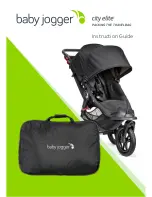
Checking and care instructions
All the materials we use can easily be cared for.
Care of the fabric parts
Clean soiled fabrics when dry using a clothes-brush or lukewarm water (then use hair dryer). Do not rub
fabrics extensively. Remove tenacious stains using a soft detergent. All removable fabric parts may be
machine washed in lukewarm water at a gentle setting and reduced agitation, at 30 °C. Let‘s say you have
encountered a heavy rain shower. Dry your carriage with the hood still on in a dry and airy room using a
cloth. This prevents marking as well as the underlining fabrics from moist soaking in through the seams. As
a guaranteed protection against rain, we recommend that you use our rain cover, which is either included
or can be purchased at your dealer‘s. Our fabrics have quite a number of distinctive features. However,
they are very sensitive to excessive sunlight. That‘s why you should park your carriage in the shade
whenever possible.
Care of the chassis
The chassis requires regular care. You should clean and slightly lubricate the wheel axles at a regular
4-weeks interval. Before oiling the wheels and push-in axles, make sure these are absolutely clean and free
of sand etc., in order not to compromise the proper working of the locking mechanism. Use a silicone based
lubricant spray for all moving plastic parts to maintain them in an operative condition. Keep all coated and
chrome-plated metal parts in dry condition, and use a finish restorer or chrome paste if necessary. Remove
smaller chassis paint damages by means of a touch-up applicator.
Do not use high-pressure cleaners
when cleaning your carriage, due to risk of damaging the ball bearings of the wheels (greased) and
other functional parts (grinding and creaking noise). Wheels:
Overpressure may result in accidents
and personal injuries. Replace worn plain wheel bearings and springs in time. Replace worn plain wheel
bearings and springs in time. Little stones in the thread, etc. may just as well damage the floor covering.
When parking the carriage in the blazing sun or cramming it in the boot at temperatures of above 40°C, the
semi pneumatic tires may flatten or become deformed.
For pneumatic tires
When using pneumatic wheels, make sure they have got enough air in the tire. Specified tire inflation
pressure should be between 1.2 and 1.5bar max.
WARNING!
Max. tire pressure will be reached quickly. Tires tend to lose
air over time. When blowing up a flat tire, inflate it only halfway first, and make sure the tire is evenly
seated, to avoid “wobble”. Replace worn plain wheel bearings and springs in time. Then continue to inflate
it to the proper pressure.
Instructions for use
Suitability for the child
The seat unit is designed for a child from 6 months, and weighing up to 15 kg (33 lbs).
WARNING!
Only use the seat unit once your child can sit up on its own.
For children under six months, only in conjunction with a suitable carrycot.
The XL carrycot is designed for children from 0-12 months, maximum weight 9 kg.
10













































